人教版高中英语必修1-第一单元-unit-1-单元整体教案
人教版高中英语必修一 Unit1 Friendship 教案
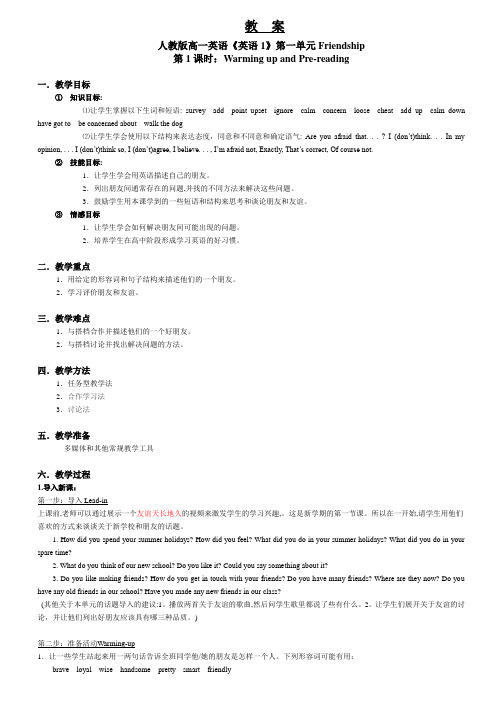
教案人教版高一英语《英语1》第一单元Friendship第1课时:Warming up and Pre-reading一.教学目标①知识目标:⑴让学生掌握以下生词和短语: survey add point upset ignore calm concern loose cheat add up calm down have got to be concerned about walk the dog⑵让学生学会使用以下结构来表达态度,同意和不同意和确定语气: Are you afraid that. . . ? I (don’t)think. . . In my opinion, . . . I (don’t)think so, I (don’t)agree, I believe. . . , I’m afraid not, Exactly, That’s correct, Of course not.②技能目标:1.让学生学会用英语描述自己的朋友。
2.列出朋友间通常存在的问题,并找的不同方法来解决这些问题。
3.鼓励学生用本课学到的一些短语和结构来思考和谈论朋友和友谊。
③情感目标1.让学生学会如何解决朋友间可能出现的问题。
2.培养学生在高中阶段形成学习英语的好习惯。
二.教学重点1.用给定的形容词和句子结构来描述他们的一个朋友。
2.学习评价朋友和友谊。
三.教学难点1.与搭档合作并描述他们的一个好朋友。
2.与搭档讨论并找出解决问题的方法。
四.教学方法1.任务型教学法2.合作学习法3.讨论法五.教学准备多媒体和其他常规教学工具六.教学过程1.导入新课:第一步:导入Lead-in上课前,老师可以通过展示一个友谊天长地久的视频来激发学生的学习兴趣,。
这是新学期的第一节课。
所以在一开始,请学生用他们喜欢的方式来谈谈关于新学校和朋友的话题。
1. How did you spend your summer holidays? How did you feel? What did you do in your summer holidays? What did you do in your spare time?2. What do you think of our new school? Do you like it? Could you say something about it?3. Do you like making friends? How do you get in touch with your friends? Do you have many friends? Where are they now? Do you have any old friends in our school? Have you made any new friends in our class?(其他关于本单元的话题导入的建议:1。
人教版高中英语必修一教案Unit 1 Friendship (含答案)
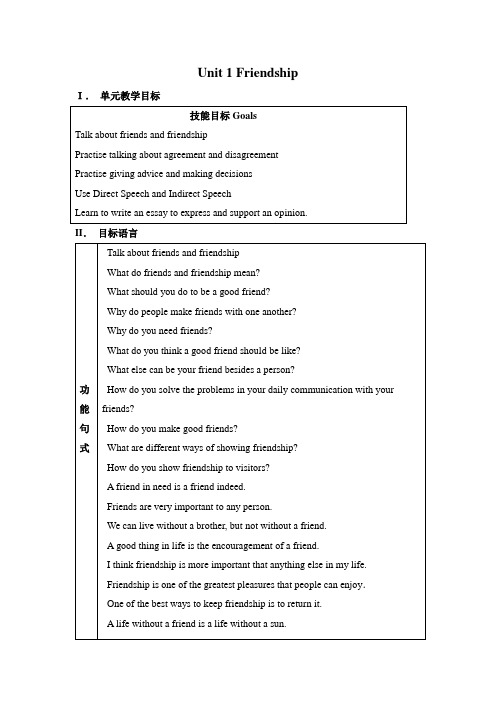
Unit 1 Friendship I.单元教学目标II.目标语言III. 教材分析和教材重组1. 教材分析本单元以Friend和Friendship为话题,旨在通过单元教学使学生通过讨论什么是好朋友,什么是真正的友谊,如何交友和保持友谊等问题,使学生树立正确的交友观。
并针对日常交友过程中经常遇到的实际问题,指导学生发表自己的见解和看法,通过进一步讨论提供有效的解决方案。
并能就此以编辑的身份写出指导信,对相关谚语写出观点明确、论证有力的短文。
1.1 Warming Up以调查问卷的形式,通过对学生在日常交友过程中所遇到的五个问题,展开调查,使学生对是否擅长交友做出评价,激发学生对本单元的中心话题产生兴趣;同时也使教师本单元的授课更具有针对性,从而有效地帮助学生树立正确的交友观。
1.2 Pre-Reading通过四个问题引导学生讨论交友的重要性以及自己心目中好朋友的概念和标准,并使学生认识到不仅人与人,人与物(如日记)也可以成为好朋友。
继续探究并树立正确交友观,并为阅读作好了准备。
1.3 Reading讲述第二次世界大战的纳粹统治时期,犹太人Anne一家过着滇沛流漓,与世隔绝的生活。
Anne在孤独中只能以日记Kitty 为友,倾诉衷肠,伴其渡过两年的逃亡生涯。
控诉了纳粹党的残暴统治给犹太人民带来了深重的灾难,并以日记的形式表达了以主人公Anne为代表的全世界人民憎恨战争渴望和平的共同心愿。
学生学习了新的词汇、句型,提高了阅读水平。
文中选用了主人公的一篇日记,使学生进一步感受到了挚友的可贵,对主人公内心世界的描写有了更深刻的理解。
1.4 Comprehension 设计了三种题型。
其中前两个是考查学生对READING文章细节内容的理解,最后一题是开放性问题,学生可以在更深入理解主人公内心世界的基础上各抒己见,使学生养成勤于思考勇于探究的良好的学习习惯,现时也培养了学生的想象力,进一步提高了阅读水平。
高中英语人教版选择性必修第一册Unit1 Period1教案
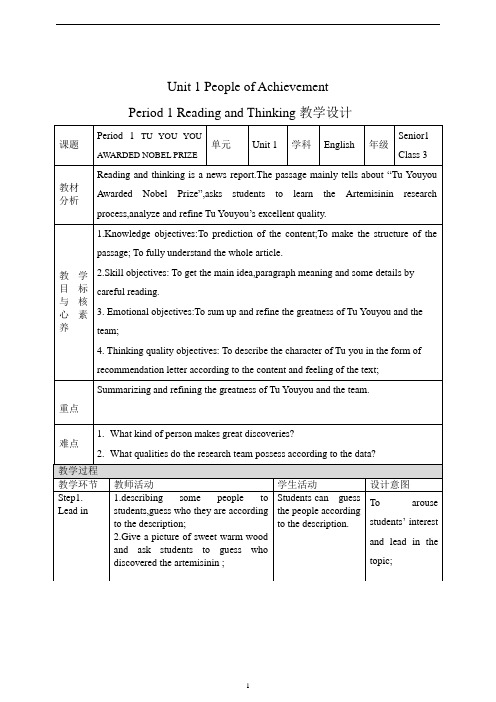
Unit 1 People of Achievement Period 1 Reading and Thinking教学设计课题Period 1 TU YOU YOUAW ARDED NOBEL PRIZE 单元Unit 1 学科English 年级Senior1Class 3教材分析Reading and thinking is a news report.The passage mainly tells about “Tu Youyou Awarded Nobel Prize”,asks students to learn the Artemisinin research process,analyze and refine Tu Youyou’s excellent quality.教学目标与核心素养1.Knowledge objectives:To prediction of the content;To make the structure of the passage; To fully understand the whole article.2.Skill objectives: To get the main idea,paragraph meaning and some details by careful reading.3. Emotional objectives:To sum up and refine the greatness of Tu Youyou and the team;4. Thinking quality objectives: To describe the character of Tu you in the form of recommendation letter according to the content and feeling of the text;重点Summarizing and refining the greatness of Tu Youyou and the team.难点1.What kind of person makes great discoveries?2.What qualities do the research team possess according to the data?教学过程教学环节教师活动学生活动设计意图Step1. Lead in 1.describing some people tostudents,guess who they are accordingto the description;2.Give a picture of sweet warm woodand ask students to guess whodiscovered the artemisinin ;Students can guessthe people accordingto the description.To arousestudents’ interestand lead in thetopic;Step6: Homework 1. Memorize new words.2. Preview Language Points.。
2019统编人教版高中英语必修第一册unit1《Teenagelife》全单元教案教学设计

[2019统编版】人教版高中英语必修第一册Unit1全单元备课教案教学设计Unit1Teenage life1.1Period1Listening and Speaking1.2Period2Reading and Thinking1.3Period3Discovering useful structures1.4Period 4Reading for writing1.1Period1Listening and Speaking教学目标与核心素养;1.Let students master the useful words and expressions about school clubs and ways to express their hobbies or interests2.Let students briefly understand functions of different clubs and be aware of the ways of choose a suitable club.3.Get students to practice grasping topics and details while listening a dialogue.4.Get students to talk about topics relating to campus clubs.教学重难点;Importance:1.Get students to practice grasping topics and details while listening a dialogue.2.Get students to talk about topics relating to campus clubs.Difficulty:Guide the students to combine the topic with useful expressions about interests and preferences,and express themselves freely.课前准备:1.Ask the students to make preparations in vocabulary and phrases related to the theme of the period.2.Help the students to finish the Guided Learning Plan教学过程:Step IWarming upActivity1Ask Ss to match the photos with the names of the clubs.And hold a brief discussion about what the students are doing in the clubs.Step2Listening(1)Activity2Guide the students to listen to the first two conversations and choose the correct answers.Remind the students to pay attention to the Predict Content:Before you listen,you can read the questions and choices.It will help you topredict what you will hear."What are they learning about in Conversation1?(A)l.A.HearingB.SoundsC.Dogs.The students are discussing in Conversation2.(C)2.A.school workB.relationshipsC.dating.3.Circle the two clubs where these two conversations happened.(A)( D)A.Science ClubB.Ballet ClubC.Nature ClubD.Debate ClubActivity3Guide the students to listen to conversations.Then finish the following exercise.1.Tick the activities that happen in each club.Ballet Club Nature Club Cartoon Club Volunteer Clublearn new movements listen to lectures watch cartoons help old peoplewatch dance programs grow plants writes stories clean up parksmake Ballet clothes work in a greenhouse draw cartoons give directions.2.Adams says that he likes but is not so interested in・(B)A.stories,cartoonsB.animals’plantsC.making friends,cleaning up.3.Which club do you think is suitable for Adam?Why?I think Adam should join the Volunteer Club because he likes to do somethine outdoors.Step3SpeakingActivity4Organize the students to working pairs and help each other choose a school club.Make some preparations before pair work.Brainstorm USEFUL WORDS and EXPRESSIONS FOR THE PAIR WOWRK.Are you going to join…?・I'd like to...,but I am not sure.....Which club do you like to join?・Have you decided which club to join?・My dream is to be.......is not for me..I like …,but I am not so interested in....•••Provide an example for the students to modify.EXAMPLEA:Hi,Sam! I f ve decided to join the Music Club.B:Good decision!A:How about you?Are you going to join a club?B:Yes I'm wondering which one I should choose:the Act Club or the Ballet Club?A:I guess the question is...Do you like dancing better than acting?B:Actually,I like acting better;but my friends go to the Ballet Club and I want to be with them.A:Hmm…If you ask me,I think you should choose what you like.Step5PronunciationActivity5Listen and repeat.Guide the students to listen and pay attention to the combinations of lettersEncourage the students to add more words to each groupProvide help whenever necessary.al talk,wall,ball,fall,call,all...ay pay,stay,delay day7may,play,display,away...ai paint,daily,gain,pain,hailstone,wait...are care,declare,dare,prepare,spare,scare...ar bar,hard,car;star,large,enlarge...er her,prefer;teacher,farmer,paper...ir bird,circus,circle,,third,thirsty,fir;birthday,shirt,dirty...or horse,absorb,bore,door,story...or word,work...ur burn,hurt,fur,turn,nurse,turtle,purple...ee keen,tree,fee,seem,feet,teeth...ea clean,eager,teach,leave,speak...ea head,ready,bread』weather,sweater,heavy...ear clear;appear,fear;hear,dear,near,ear,...ear earn,heard,search,learn,earn,earth...oa boat,coach,coat,goat,load,...ow show,grow low,blow,slov^follow,eyebrow...ow now,shower,town』down,how,tower...ou out,loud,about,loud』doubt,mouth,house,mouse...ore more,bored,forecast,forehead,core...2.Guide the students to listen to the proverbs and repeat.Notice the pronunciation of the letters in bold.1.The early bird catches the worm.2.Always prepare for a rainy day.3.Actions speak louder than words.4.All work and no play makes Jack a dull boy.5.Distance tests a horse's strength.Time reveals a person's character.Period 2 Reading and Thinking教学目标与核心素养:1.Let students master useful words and phrases related to the text;2.Let students understand the challenges Adam meets in his new school and compare the similarities and differences of their school and Adam's;3.Help the students finish vocabulary exercises in the text book.4.Get students to understand they should learn to face difficulties and challenges in senior high school for their own future.教学重难点:Importance:Help the students to master key words and phrases in the text.Guide students to compare school life in different places.3.Guide the students to learn about Adam*s school life and understand that everyone should overcome difficulties in a new situation.Difficulty:Guide the students compare their school life and Adam's,and discuss ways to deal with challenges.课前准备:1.Ask the students to prepare new words and phrases related to the contents of the text.2.Mark the new words in the textbook,understand the meaning in context,or consult the dictionary to understand the meaning.教学过程:Step1Preparationfreshman junior high schoolSenior high schoolconfusing choose courses sign up_____________ext r a-curr i cu1a r activities hand outhomeless peoplein the community get used to doing keep up with_____________challenge topic fluentgraduaterecommend_____________literature__________obviously __________quit__________be responsible for schedule editorStep2 Warming upCompare school life in different placesActivity1Guide the students to take part in the group work and discuss school life in and out of China.Ask Ss to work in groups and discuss the questions.What do you want to know about the school life in other countries?Possible answers:I want to know whether they take extra courses during summer or winter vocations.I wonder if they have enough free time to develop their own interests.I am interested in what subjects they study at school.What would you tell a teenager from another country about school life in China?I am happy to come to my new school and know a lot of new friends.Our teachers are patient and helpful.I feel a little worried about my study because I have more subjects to learn.Activity2Read the text quickly to find the main idea of each paragraph.Guide the students to read the text quickly and fill in the blanks in this part.Possible answers:Paragraph1:Senior high school is a Challenge.Paragraph2:It is important to choose courses.Paragraphs:Extrr-curricular activities are also important.Paragraph4:A senior high student must work harder and be more responsible.Step3Intensive readingActivity3Read the text again and answer the questions.Guide the students to read the text carefully and find the answers to the following questions.What causes did Adams choose?Which one do you think would be his favorite?Why?What does"make the team”in paragraph mean?What is Adam worried about?Is Adam confident that he will get used to senior school life?How do you know?Possible answers:Adam chooses Math,English chemistry,world history and Chinese.I think.English advanced literature is his favorite because he likes English,and he is good at it.It means joining the football team.He is worried that he can't keep up with other students in his advanced course and get used to all the homework.Yes,he is.On the one hand,Adam knows that he has to study harderas a senior school student to be well prepared for his future.On the other hand,Adam knows that school advisers and teacher can give him help when he is faced with problems.Activity 4Complete the outline.Then discuss the questions below with a partner.Get the students to work in pairs and fill in the blanks after discussing the questions carefully.Encourage the students to find clues from the text.Par agraph Challenge How AdamfeelsSolution1Becoming a freshman at seniorhigh school Confused—2Choosingsuitable courses Hopeful The school advisorhelps him choosesuitable courses.3Joining the school football Unhappy He will find a wayto improve on his own.team4Keeping up with the other students Worried He will studyharder and be morein his advancedcourses:responsible.Guide the students to discuss the following questions and encourage them to answer the questions according to Adam's story and their own situation.What kind of person do you think Adam is?Why?Do you face the same challenges as Adams?What other challenges areyou facing?What are some differences between Adam*s school and your school life?Possible answers:Adam is clear-minded and responsible for himself.When he chooses courses,he knows his advantages□He is determined.Although he was refused by the coach,he decides to improve himself in football.He is responsible for himself.He hopes to learn Chinese well for his future although it is difficult.Yes,I am also faced with challenge in my study.I also feel it hard to make new friends when I come to a new school.As for my study,I think studying hard is a good way and of course I will get help from my teachers when necessary.I will try to talk more and help others when they are in need.I believe in this way I can make more friends.3.We don't have a school adviser and don*t have as many clubs as Adam's school.Step 5Consolidation in vocabularyComplete the sentences with correct forms of the new words from the test.I am good at maths,so my teacher recommended that I should choose advanced maths in my first year.Finding time of for both studies and extra-curricular activities is a big challenge,so I need to make a workable schedule.It is a little confusing to choose suitable causes.I hope that my adviser can help me make a good decision.We can try a course for two weeks after we sign up for it.After that, we cannot change it.The main purpose of the course is to help improve each student's reading ability.Some of the students want to become writers or editors after they graduate,so the teacher advised them to start a writing club.The school is responsible for the safety of all students.Whenever I'm facing a difficulty,I always tell myself,"Don't let anything stop you.Don't ever quit.Period3Discovering useful structures教学目标与核心素养;1.Let students learn and recognize Noun Phrase,Adjective Phrase and Adverb Phrase.2.Let students master the function of Noun Phrase,Adjective Phrase and Adverb Phrase.3.Get students improve a draft by using Xoun Phrase,Adjective Phrase and Adverb Phrase.教学重难点;Importance:1.Get students to recognize and realize the importance of Noun Phrase, Adjective Phrase and Adverb Phrase in polishing a draft.2.Get students to finish a draft improvement.Difficulty:Guide the students finish the task of improving a draft课前准备:1.Ask the students to make preparations in vocabulary and phrases related to the theme of the period.2.Help the students to finish the Guided Learning Plan教学过程:Step1Warming upActivity1Ask Ss to look at the given pictures and choose a better answer to match the pictures.Step 2 Learn about Noun Phrase,Adjective Phrase and Adverb Phrase Activity 2Guide the students to learn about the definitions and functions of Noun Phrase,Adjective Phrase and Adverb Phrase.Remind the students to understand the instructions and divide thephrases in different groups.短语类型组成功能名词短语(限定词)+ (形容词、形容词 短语、描述性名词)+名词+(介 词短语)在句中相当于名词,一般用作主语、宾语、表语或宾语补治形容词短语(副词)+形容词+ (介词短语)在句中当作形容词用,可以修饰名词或代词,还可以用作表语或宾语补语副词短语(副词)+副词在句中当作副词用,可以修饰动词、形容词或副词Noun phrase:。
人教版高中英语必修一unit1教案最终版
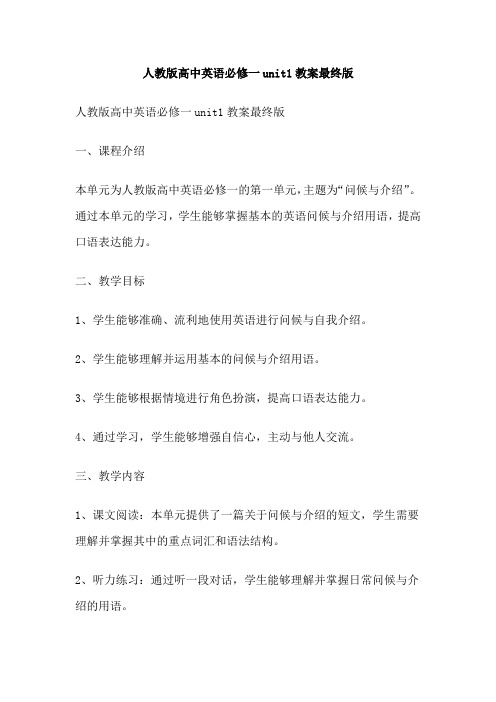
人教版高中英语必修一unit1教案最终版人教版高中英语必修一unit1教案最终版一、课程介绍本单元为人教版高中英语必修一的第一单元,主题为“问候与介绍”。
通过本单元的学习,学生能够掌握基本的英语问候与介绍用语,提高口语表达能力。
二、教学目标1、学生能够准确、流利地使用英语进行问候与自我介绍。
2、学生能够理解并运用基本的问候与介绍用语。
3、学生能够根据情境进行角色扮演,提高口语表达能力。
4、通过学习,学生能够增强自信心,主动与他人交流。
三、教学内容1、课文阅读:本单元提供了一篇关于问候与介绍的短文,学生需要理解并掌握其中的重点词汇和语法结构。
2、听力练习:通过听一段对话,学生能够理解并掌握日常问候与介绍的用语。
3、口语表达:学生需要进行多次口语练习,包括个人介绍、两人对话、小组讨论等,提高口语表达能力。
4、写作训练:学生需要写一篇关于自己或他人的介绍文章,巩固所学知识。
四、教学步骤1、导入新课:通过简单的问候,引导学生进入本单元的主题。
2、讲解新词:学习本单元的新单词,包括生词、词组和习惯用法。
3、课文阅读:阅读本单元提供的短文,并回答相关问题。
4、听力练习:听一段对话,并回答相关问题。
5、口语表达:进行多次口语练习,包括个人介绍、两人对话、小组讨论等。
6、写作训练:写一篇关于自己或他人的介绍文章。
7、复习巩固:回顾本单元所学内容,加深印象。
五、教学评价1、课堂提问:通过提问,检测学生对本单元重点内容的掌握情况。
2、小测验:进行小测验,检测学生对本单元重点词汇、语法和习惯用法的掌握情况。
3、课后作业:布置课后作业,让学生巩固本单元所学内容。
六、教学反思1、成功之处:通过多种教学方法的运用,本节课取得了良好的教学效果,学生积极参与,课堂氛围热烈。
2、不足之处:部分学生的口语表达能力还有待提高,需要加强针对性的训练。
3、改进措施:针对学生的不足,制定个性化的教学方案,加强针对性的训练,提高学生的口语表达能力。
最新人教版高中英语必修一+Unit+1++Friendship全单元教案(精品)名师优秀教案
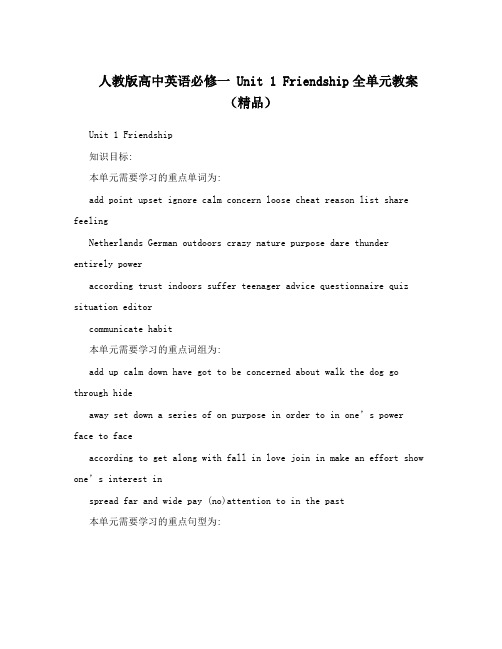
人教版高中英语必修一 Unit 1 Friendship全单元教案(精品)Unit 1 Friendship知识目标:本单元需要学习的重点单词为:add point upset ignore calm concern loose cheat reason list share feelingNetherlands German outdoors crazy nature purpose dare thunder entirely poweraccording trust indoors suffer teenager advice questionnaire quiz situation editorcommunicate habit本单元需要学习的重点词组为:add up calm down have got to be concerned about walk the dog go through hideaway set down a series of on purpose in order to in one’s power face to faceaccording to get along with fall in love join in make an effort show one’s interest inspread far and wide pay (no)attention to in the past本单元需要学习的重点句型为:1. You want to see a very interesting film with your friend, but your friend can’t go until he or she finishes cleaning the bicycle. (not. . . until. . . )2. When he or she borrowed it last time, he or she broke it and you had to pay to get itrepaired. (get sth. done)3. While walking the dog, you were careless and it got loose and was hit by a car. (while doing; get+adj. )4. Your friend, who doesn’t work hard, asks you to help him or her to cheat in the exam by looking at your paper, what will you do? (the Attributive Clause)5. I don’t want to set down a series of facts in a diary as most people do, but I want this diary itself to be my friend. (as. . . )6. I wonder if it’s because I haven’t been able to be outdoors for so long time that I’ve grownso crazy about everything to do with nature. (I wonder if/whether; it’s . . . that. . . )7. . . . I stayed awake on purpose until half past eleven one evening in order to have a goodlook at the moon for once by myself. (stay+adj. ; in order todo. . . )8. But as the moon gave far too much light, I didn’t dare open a window. (don’t dare(to)do. . . )9. . . . it was the first time in a year and a half that I’d seen the night face to face. . . (It is/was the first/second. . . time that+现在/过去完成时)10. Although I really try to talk to my classmates, I still find it hard to make good friendswith them. (find it+adj. /n. +to do. . . )本单元需要掌握的交际功能用语为:1. 态度(attitudes)Are you afraid that. . . ? I’ve grown so crazy about. . . I didn’t dare. . .2. 同意和不同意(agreement and disagreement)I agree. I think so. Exactly.I don’t agree. I don’t think so. I’m afraid not.3. 肯定程度(certainty)That’s correct. Of course not.本单元需要掌握的语法为:直接引语和间接引语(?):陈述句和疑问句1. 陈述句“I don’t want to set down a series of facts in a diary, ” said Anne.? Anne said that she didn’t want to set down a series of facts in a diary.2. 一般疑问句He asked, “Are you leaving tonight? ”? He asked us whether we were leaving that night.3. 特殊疑问句“When did you go to bed last night? ” father said to Anne.? Father asked Anne when she went to bed the night before.能力目标:1. 能运用所学语言讲述朋友间发生的事情以及朋友间的友谊和友情。
英语人教版高中必修一(新课标)教案Unit1 Listening and Talking 教案
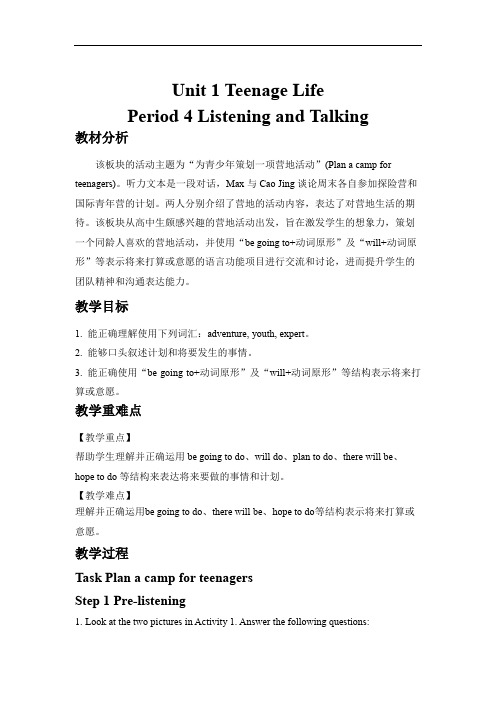
Unit 1 Teenage LifePeriod 4 Listening and Talking教材分析该板块的活动主题为“为青少年策划一项营地活动”(Plan a camp for teenagers)。
听力文本是一段对话,Max与Cao Jing谈论周末各自参加探险营和国际青年营的计划。
两人分别介绍了营地的活动内容,表达了对营地生活的期待。
该板块从高中生颇感兴趣的营地活动出发,旨在激发学生的想象力,策划一个同龄人喜欢的营地活动,并使用“be going to+动词原形”及“will+动词原形”等表示将来打算或意愿的语言功能项目进行交流和讨论,进而提升学生的团队精神和沟通表达能力。
教学目标1. 能正确理解使用下列词汇:adventure, youth, expert。
2. 能够口头叙述计划和将要发生的事情。
3. 能正确使用“be going to+动词原形”及“will+动词原形”等结构表示将来打算或意愿。
教学重难点【教学重点】帮助学生理解并正确运用be going to do、will do、plan to do、there will be、hope to do等结构来表达将来要做的事情和计划。
【教学难点】理解并正确运用be going to do、there will be、hope to do等结构表示将来打算或意愿。
教学过程Task Plan a camp for teenagersStep 1 Pre-listening1.Look at the two pictures in Activity 1. Answer the following questions:(1)What kind of camp is Adventure Camp/International Youth Camp?(2)What activities will it include?(3)What can students learn in these activities?2.Read the sentences in Activity 1. Then predict the main idea of the conversation. Step 2 While-listening1. Work on Activity 1. Listen to the conversation and tick what are heard about the camps.2.Work on Activity 2. Underline the expressions in the sentences above that Cao Jing and Max use to talk about the future.设计意图:该环节让学生通过勾画听力文本中的目标结构,关注对话中如何表达将来要做的事情和计划。
高一英语必修一第一单元教案
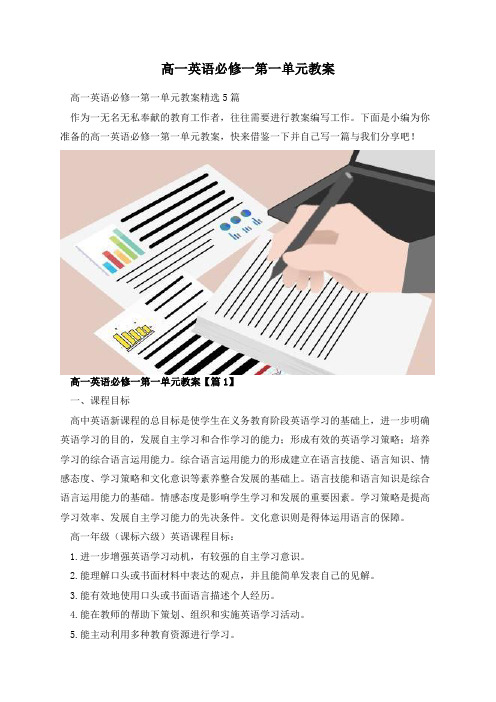
高一英语必修一第一单元教案高一英语必修一第一单元教案精选5篇作为一无名无私奉献的教育工作者,往往需要进行教案编写工作。
下面是小编为你准备的高一英语必修一第一单元教案,快来借鉴一下并自己写一篇与我们分享吧!高一英语必修一第一单元教案【篇1】一、课程目标高中英语新课程的总目标是使学生在义务教育阶段英语学习的基础上,进一步明确英语学习的目的,发展自主学习和合作学习的能力;形成有效的英语学习策略;培养学习的综合语言运用能力。
综合语言运用能力的形成建立在语言技能、语言知识、情感态度、学习策略和文化意识等素养整合发展的基础上。
语言技能和语言知识是综合语言运用能力的基础。
情感态度是影响学生学习和发展的重要因素。
学习策略是提高学习效率、发展自主学习能力的先决条件。
文化意识则是得体运用语言的保障。
高一年级(课标六级)英语课程目标:1.进一步增强英语学习动机,有较强的自主学习意识。
2.能理解口头或书面材料中表达的观点,并且能简单发表自己的见解。
3.能有效地使用口头或书面语言描述个人经历。
4.能在教师的帮助下策划、组织和实施英语学习活动。
5.能主动利用多种教育资源进行学习。
6.能初步对学习过程和结果进行自我评价,调整自己学习目标和策略。
7.能体会交际中所使用语言的文化内涵和背景。
高一年级(课标七级)英语课程目标:1.有明确和持续的学习动机和自主学习意识。
2.能就熟悉的话题交流信息,提出问题并且陈述自己的意见和建议。
3.能读懂供高中学生阅读的英文原著简写本及英语报刊。
4.具有初步的实用写作能力,例如:事务通知和邀请信等。
5.能在教师的指导下,主动参与计划、组织和实施语言实践活动。
6.能主动扩展和利用学习资源,从多渠道获取信息,并能利用所获得的信息进行清楚和有条理的表达。
7.具有较强的自我评价和自我调控能力,基本形成适合自己的学习策略。
8.理解交际中的文化差异,初步形成跨文化交际意识。
二、课程内容完成牛津英语第三第四模块的全部内容。
英语人教版高中必修一教案Unit1 Discovering Useful Structures

Unit 1 Teenage LifePeriod 3 Discovering Useful Structures 教材分析该板块的活动主题为“润色文稿”(Improve a draft),目标语法知识是名词短语、形容词短语和副词短语的用法。
学生在熟练掌握名词短语、形容词短语和副词短语的形式和意义后,能够将其运用到语篇中,使语言表达更加充实、生动和准确。
教学目标1. 能正确理解使用下列词汇:category, function, noun phrase, adjective phrase, adverb phrase。
2. 能够理解并正确运用名词短语、形容词短语和副词短语。
3. 能通过使用名词短语、形容词短语和副词短语润色语言表达,使其更加充实、生动和准确。
教学重难点【教学重点】帮助学生在语篇中理解并运用名词短语、形容词短语和副词短语,丰富语篇表达内容,提高语篇质量。
【教学难点】引导学生熟练掌握名词短语、形容词短语和副词短语的形式和意义。
教学过程Task Improve a draftStep 1 Warming-upRead the poem aloud and see how the underlined parts work in the poem: Nothing so rareAs a day in June,The air so fineAnd the blossoms all blue....Its beautiful melodyFloats like a balloon.Step 2 Observing1. Work on Activity 1. Students find and mark the noun/ adjective/ adverb phrases in the following sentences:(1) The first week was a little confusing.(2) The building is so big that I’m completely lost.(3) The kids over there are putting something on a round paper plate....2.Students observe the sentences again and state the phrases’ functions.设计意图:该环节让学生通过观察例句,发现句子中的目标短语结构,进一步感知其在语言表达中所起到的作用。
人教版高一英语必修一unit1教案
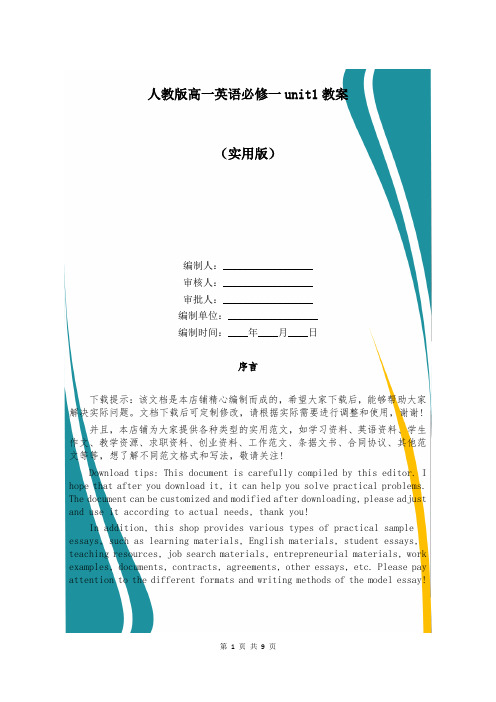
人教版高一英语必修一unit1教案(实用版)编制人:__________________审核人:__________________审批人:__________________编制单位:__________________编制时间:____年____月____日序言下载提示:该文档是本店铺精心编制而成的,希望大家下载后,能够帮助大家解决实际问题。
文档下载后可定制修改,请根据实际需要进行调整和使用,谢谢!并且,本店铺为大家提供各种类型的实用范文,如学习资料、英语资料、学生作文、教学资源、求职资料、创业资料、工作范文、条据文书、合同协议、其他范文等等,想了解不同范文格式和写法,敬请关注!Download tips: This document is carefully compiled by this editor. I hope that after you download it, it can help you solve practical problems. The document can be customized and modified after downloading, please adjust and use it according to actual needs, thank you!In addition, this shop provides various types of practical sample essays, such as learning materials, English materials, student essays, teaching resources, job search materials, entrepreneurial materials, work examples, documents, contracts, agreements, other essays, etc. Please pay attention to the different formats and writing methods of the model essay!人教版高一英语必修一unit1教案This is the first period of this unit.In this period,students are expected to discuss what kind of person they are.The purpose is to give students chance to practice their oral English,at the same time.一起看看人教版高一英语必修一unit1教案!欢迎查阅!高一英语必修一unit1教案1This is the first period of this unit.In this period,students are expected to discuss what kind of person they are.The purpose is to give students chance to practice their oral English,at the same time,they can have a general idea about what are the qualities they should find in a great person.In this period,there is a part designed to practice speaking and reading.In order to make students have a thorough idea of qualities great people have in common,and predict the contents of reading,it is important to make good use of the six pictures,especially Nelson Mandela.What’s more,this is the first period of this unit,so it is necessary to deal with the new words and expressions of this part,so as to make it easy for students to begin and make them less anxious in study.●三维目标 1.Knowledge:Learn and master the new words and expressions in thisperiod. Words:hero,quality,willing,active,republic,principle,nationalism,livelihood,fight,peaceful,prison,prisoner,law,advise,continue,fee,gold,passbook,ANC,youth,league,stage,vote,position,accept,violence,equal Phrases:lose heart,in trouble,worry about,out of work,Youth League,as a matter of fact,blow up,put...in prison2.Ability:(1)Talk about the fine quality of great people to improve the students’ speaking ability. (2)Do reading practice to improve the students’ reading abilities. 3.Emotion:(1)Learn about some great people and qualities they have in common. (2)Develop the students’ moral quality. ●教学重点(1)Talk about the fine quality of great people to improve the students’ speaking ability. (2)Enable the students to grasp the main idea of the passage. (3)Improve the students’reading ability. ●教学难点(1)How to express their own opinions and ideas. (2)How to grasp the main idea of a text or a passage. ●教具准备The multimedia and the blackboard. ●教学过程 Step 1 GreetingsGreet the whole class as usual. Step 2 Lead-in T: (Walkto one boy) Wang Bin,what do you usually do on weekends? S1:I sometimes play basketball with friends.I like basketball very much.T:Do you know who he is?S1:Of course I do.He is Jordan,my idol.He is the best basketball player in the world.I have many pictures of him.T:Yes,you’re quite right.He is very famous and many people all over the world worship him.But do you know that it was not until about fifty years ago that the blacks got their freedom and were treated as equal citizens?S2:Yes,we learnt about this in our history classes.The blacks were first brought to America as slaves.They were treated badly and they had no rights.T:That’s right.But we all know that things are different now.Do you know how they could have the same rights as the whites?S3:We don’t know much about this.Please tell us more.T:OK.Many people devoted themselves to this.Some were put into prison and some even lost their lives.Look at the two pictures and read the notes about them.Then have a discussion in groups of four.Try to explain why they are great men.(Show the following pictures and their information on the screen高一英语必修一unit1教案2(1) 课题:Earthquakes (2) 教材分析与学生分析:本单元的主题是“地震”。
人教版高中英语必修1-第一单元-unit-1-单元整体教案
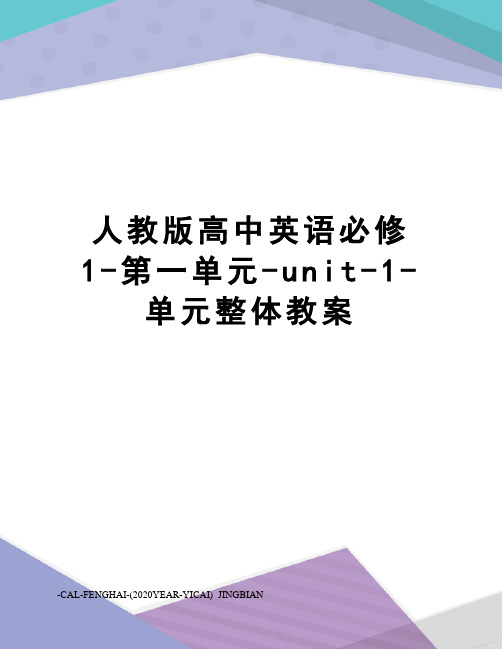
人教版高中英语必修1-第一单元-u n i t-1-单元整体教案-CAL-FENGHAI-(2020YEAR-YICAI)_JINGBIANU nit one FriendshipTeaching aims:1.能力目标:a.Listening: get information and views from the listening material;b.Speaking: express one’s attitude or views about friends and friendship inappropriate words.c.Reading: enable the Ss to get the main idead.Writing: write some advice about making friend as an editor2.知识目标:a.Talk about friends and friendship; how to make friends; how to maintainfriendshipe the following expressions:I think so. / I don’t think so.I agree. / I don’t agree.That’s correct.Of course not.Exactly.I’m afraid not.c. to enable the Ss to control direct speech and indirect speechd. vocabulary: upset , calm , concern , loose, Netherlands, German, series, outdoors, dusk, crazy , purpose , thunder , entire, entirely, power , curtain, dusty, partner, settle, suffer , highway, recover, pack, suitcase, overcoat, teenager, exactly, disagree, grateful, dislike, tip , swap , itemadd up \ calm down\ have got to \be concerned about \ walk the dog \ go through \ set down \a series of \ on purpose \ in order to \ at dusk \ face to face \ nolonger\not …any longer\ suffer from\ get\be tired of \ pack sth. up \get along with \ fall in love \ join in3. 情感目标:a. To arose Ss’ interest in learning English;b. To encourage Ss to be active in the activities and make Ss to be confident;c. To develop the ability to cooperate with others.4. 策略目标:a. To develop Ss’ cognitive strategy: taking notes while listening;b. To develop Ss’ communicative strategies.5. 文化目标:to enable the Ss to get to know different opinions about making friends from different countries.Teaching steps:Period oneStep1. Warming up1. Ss listen to an English song AULD LANG SYNE.2. Brainstorming: let Ss say some words about friendship – honest, friendly, brave,humorous, funny, wise, kind, open-minded, responsible, helpful….Step 2. Talk about your old friends1.Ss talk about their old friends in Junior Middle School, talk about theirappearance, personality, hobbies, etc.2.Self-introductionStep 3. Make new friends1.Ss go around and ask their new friends some information and fill in the following3.Step 4. Do a surveySs do the survey in the text ,P1Sep 5. Listening and talkingDo Wb P41 (Talking). While Ss listen to the material, ask them to take notes about the speaker’s views of making friends.When Ss make their conversation, ask them to try to use the following expressions.I think so. / I don’t think so. I agree. / I don’t agree.That’s correct. Of course not. Exactly. I’m afraid not.Step 6. DiscussionDivide Ss four in one group and each group choose a topic to discuss. There are four topics.Topic 1: Why do you need friendsMake a list of reasons why friends are important to you.Topic 2: There is a saying “to have a good friend, you need to be a good friend.” What do you think of the saying and how can you be a good friend?Topic 3: Does a friend always have to be a personWhat else can be your friend? Why?Topic 4: List some qualities of a person who does not make friend easily.Step 7. Summary1.Ask Ss themselves to summarize what is friendship and what is the most importantin making friends.2.T shows more information about friendship and a poem about friendship.What is friendship?I want to find the answer to the questionWhat is friendship?When it rains, I think friendship is a small umbrella.It can give me a piece of clear sky.When I’m crying, I think friendship is a white handkerchief.It can wipe my tears dry.When I am sad, I think friendship is a warm word.It can bring me happiness again.When I am in trouble, I think friendship is a strong hand.It can help me escape my troubles.When I sit in a quiet place, I think friendship is a very wonderful feeling.It can’t be pulled and torn, because it is in everyone’s heart.It is there from the beginning to the end of our lives.3. Tell Ss: make new friends and keep the old; one is silver and the other is gold. Step 8. Evaluation1.Look up the new words and expressions in warming up and pre-reading in adictionary.2.Write a short passage about your best friend.Period twoStep1.Warming upActivity1: Suppose you have to stay indoors to hide yourself for a whole year. You can never go outdoors, otherwise you will be killed. You have no telephone, computer, or TV at home.How would you feel?What would you do?Four students a group discuss with each other for 2 minutes.Activity2: Play a short part of the movies Schindler’s L istStep2. PredictingStudents read the title of the passage and observe the pictures and the outline of it to guess:Who is Anne’s best friend?What will happen in the passage?Step3. SkimmingStudents skim the passage in 2 minutes to get the main idea :Who is Anne’s best friend?When did the story happen?Step4. ScanningStudents work in pairs to find the information required below:Anne in World War ⅡStep5. Intensive readingStudents work in group of four to discuss the following open questions:1.Why did the windows stay closed?2.How did Anne feel?3.What do you think of Anne?4.Guess the meanings of “spellbound”, “ hold me entirely in their power” from the discourse(语篇,上下文).5.Which sentences attract you in the passage?Step6. ActivityFour students a group to discuss the situation:Suppose you four have to hide yourselves for 3 months. During the three months, you will be offered the basic food, water and clothes. Your group can take 5 things with you.What will you take WhyHow will you spend the 3 months?How will you treat each other and make friendsStep7.AssignmentTask1.Surf the internet to find Anne’s Diary and read some of it. Print out a piece of the diary and write down your feelings after reading it on the page. We will share the pieces and your feelings with the whole class.Task2.Ex2、3 、4on Page3What Why?How to enjoy herselfPeriod threeStep 1. Warming upCheck the Ss’ assignment: task 2Step 2. Language points:1.add (v.)1). To put together with something else so as to increase the number, size, importance, etc.增加,添加Please add something to what I’ve said, John.2). To join numbers, amount, etc so as to find the total 相加Add up these figures for me, please.add to something: to increase 增加What he did has added to out difficulties.add up to: to amount to 加起来等于;总计The cost added up to 100 million yuan.2. go through1). To examine carefully 仔细阅读或研究I went through the students’ papers last night.2). To experience 经历,遭受或忍受You really don’t know what we went through while working on this project.3. crazy (adj.)1). mad, foolish 疯狂的,愚蠢的It’s crazy to go out in such hot weather.2). wildly excited; very interested 狂热的,着迷的She is crazy about dancing.4. be concerned about/for: be worried about 担心We’re all concerned about her safety.Step 3. Learning about language1.Finish Ex.1, 2 and 3. on Page 4.2.Direct speech and indirect speech: Ss do Ex.1 and 2 on Page 5. Then let the Ssthemselves discover the structures.Step 4. PracticeUsing structures on Page 42: ask the Ss to use indirect speech to retell the story.Step 5. AssignmentFinish Wb. Ex, 1 and2 on page 41 and 42.Period fourStep 1. RevisionCheck the Ss’ assignment.Step 2. R eadingSs read the letter on page 6Notes:1.get along with2.fall in loveStep 3. ListeningSs should take notes while they are listening.1. first listening: Ss listen and answer the questions of part 2 on page 6.2. second listening: Ss listen again and finish part 3 on page 6.Step 4. ListeningSs listen to a story about Anne and try to finish Wb. Ex 1 and 2 on page 43 and page 44. Step 5. SpeakingSs work in groups of four. Design a questionnaire to find out what kind of friends your classmates are. They can use the quiz in the Warming up to help them.Step 6. Assignment1. Ss prepare the reading task on page 44.2. Surf the internet and find some material about friendship in different countries.Period fiveStep 1. Warming upSs say something about making friends and how to maintain friendship.Step 2. ListeningSs listen to a short passage and fill in the blanks on page 41 (listening).Step 3. Reading1.first reading: Ss read the passage about friendship in Hawaii and finish Wb.Ex1.onpage 44.2.second reading: Ss read again and discuss the questions on page 44.3.Ss share their material about friendship in different countries in groups, and thenchoose some groups to show theirs in class.Step 4. assignmentSs collect some proverbs about friendship.Period sixStep 1. Pre-writing1.Read a letter from a student called Xiaodong.2.Go over the advice on page 7 and be ready for writing.Step 2. While-writingAsk the Ss to write a letter to Xiaodong as an editor and give him some advice.1.Ss make a list about the important information that they need.2.Ss begin to write the letter to Xiaodong.3.Ss revise their letters by themselves.4.Ss exchange their writing paper with their partners and correct the mistakes. (tense,spelling, letters, structures….)5.Ss get back their own writing paper and write the letter again.Step 3. Post-writingChoose some students’ writing paper and show in the class. Ask the Ss to correct the mistakes together and also learn from some good writings.Step 4. Writing for fun1.Ss read the passage on page 7 by themselves.2.Ss try to write a few lines to describe their best friends or a person they know.3.Show some Ss’ writings in class.Step 5.AssignmentDo Wb writing task on page 46.Period sevenTeachers can use this period freely.Suggestion: Teachers can use this period to let Ss sum up what they have learned and explain what Ss couldn’t understand very well in this unit. Teachers can also add more practice in this period to consolidate what the Ss have learned. Finally, ask the Ss to finish checking yourself on page 47. It is very important to improve their learning.Unit 1 Friendship(1) 课题:Friendship (2) 教材分析与学生分析:本单元的中心话题是“友谊”,几乎所有的内容都是围绕这一中心话题展开的。
新人教版高中英语必修1Unit1 Friendship教案
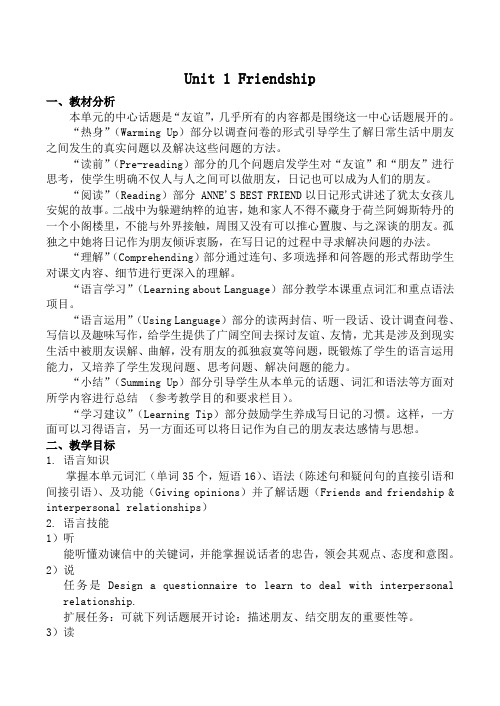
Unit 1 Friendship一、教材分析本单元的中心话题是“友谊”,几乎所有的内容都是围绕这一中心话题展开的。
“热身”(Warming Up)部分以调查问卷的形式引导学生了解日常生活中朋友之间发生的真实问题以及解决这些问题的方法。
“读前”(Pre-reading)部分的几个问题启发学生对“友谊”和“朋友”进行思考,使学生明确不仅人与人之间可以做朋友,日记也可以成为人们的朋友。
“阅读”(Reading)部分 ANNE'S BEST FRIEND以日记形式讲述了犹太女孩儿安妮的故事。
二战中为躲避纳粹的迫害,她和家人不得不藏身于荷兰阿姆斯特丹的一个小阁楼里,不能与外界接触,周围又没有可以推心置腹、与之深谈的朋友。
孤独之中她将日记作为朋友倾诉衷肠,在写日记的过程中寻求解决问题的办法。
“理解”(Comprehending)部分通过连句、多项选择和问答题的形式帮助学生对课文内容、细节进行更深入的理解。
“语言学习”(Learning about Language)部分教学本课重点词汇和重点语法项目。
“语言运用”(Using Language)部分的读两封信、听一段话、设计调查问卷、写信以及趣味写作,给学生提供了广阔空间去探讨友谊、友情,尤其是涉及到现实生活中被朋友误解、曲解,没有朋友的孤独寂寞等问题,既锻炼了学生的语言运用能力,又培养了学生发现问题、思考问题、解决问题的能力。
“小结”(Summing Up)部分引导学生从本单元的话题、词汇和语法等方面对所学内容进行总结(参考教学目的和要求栏目)。
“学习建议”(Learning Tip)部分鼓励学生养成写日记的习惯。
这样,一方面可以习得语言,另一方面还可以将日记作为自己的朋友表达感情与思想。
二、教学目标1. 语言知识掌握本单元词汇(单词35个,短语16)、语法(陈述句和疑问句的直接引语和间接引语)、及功能(Giving opinions)并了解话题(Friends and friendship & interpersonal relationships)2. 语言技能1)听能听懂劝谏信中的关键词,并能掌握说话者的忠告,领会其观点、态度和意图。
人教版高中英语必修一Unit1教案

人教版高中英语必修一Unit1教案编辑整理:尊敬的读者朋友们:这里是精品文档编辑中心,本文档内容是由我和我的同事精心编辑整理后发布的,发布之前我们对文中内容进行仔细校对,但是难免会有疏漏的地方,但是任然希望(人教版高中英语必修一Unit1教案)的内容能够给您的工作和学习带来便利。
同时也真诚的希望收到您的建议和反馈,这将是我们进步的源泉,前进的动力。
本文可编辑可修改,如果觉得对您有帮助请收藏以便随时查阅,最后祝您生活愉快业绩进步,以下为人教版高中英语必修一Unit1教案的全部内容。
Unit 1 FriendshipWarming up1。
be good tobe good for=do good tobe good at2.following adj. 下面的,下列的the following+n.=the+n.+below (形容词修饰名词放在名词之前,介词或者介词短语修饰名词置于其后)3.add v. add。
.。
to.。
add toadd upadd up toaddition n。
in addition=besides +句子“而且,其次”in addition to +n。
/doing “附加给。
.。
,除了。
.还有...”同类用法联想:because & because ofinstead & instead ofadditional adj. 附加的additionally adv。
4.分数 score grade point mark (full marks)5.until6.with 和。
..一起,附带着,用without 不。
.。
within 在。
.。
内,不出.。
E。
g。
write with a peneat with hands/ spoon/chopsticks/knife and forkHe left without saying goodbye。
He left with the water running。
人教版高一英语必修一Unit-1单元教案
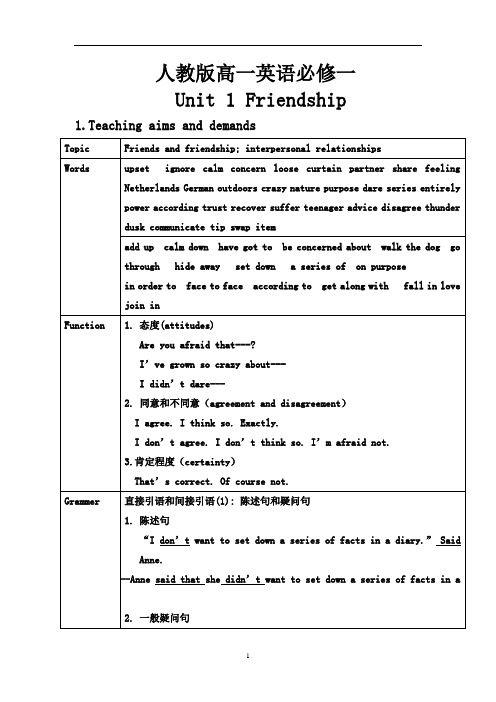
人教版高一英语必修一Unit 1 Friendship 1.Teaching aims and demands2. Teaching contentsWarming up---The questionnaire leads students to think and talk about friendship, get to know the problems between friends and seek solutions, which makes preparations for the further teaching in topics, background and vocabulary. Pre-reading---The questions prompt students to think critically about friends and friendship in reality, alerting them to the factthat besides people, a diary can be a friend, too. Reading--- The diary by theJewish girl Anne gave a glimpse of her life during her family’s shelter in Amsterdam from the German Nazis’ killing in world war 2. she treats the diary as her best friend, and in it reveals her longing for a normal lifeand close contact with nature, which helps her get throughthe days.Comprehending---It helps students further understand the text by doing multiple choices, questions and answers, andmatching.Learning about language---It teaches the important expressions andstructures and grammar: direct and indirect speeches.Using language---The two letters, listening, questionnaire design, letterwriting and fun writing prepares students to further talk about friendship, especially the problems with misunderstanding, and unfriendliness, thusstrengthening students’ abilities to practicelanguage, discover, and solve problems.Summing up---It summarizes the whole contents of this unit from the aspects of topics, vocabulary and grammar.Learning tip--- This part encourages students to form the habit of writing a diary.Reading for fun---3. Making of the teaching planThe whole teaching procedures can fall into 7 periods as follows:4. Teaching plans for each periodPeriod 1,2 Warming-up, listening and Speaking1. Teaching objectives:1) Target languageI (don’t) think…… I (don’t) think so. I (don’t) agree.I believe……That’s correct. In my opinion, ……2) Ability goalsa.Describe your friends in Englishb.Figure out the problems between friends and then find different waysto solve the problems.c.Develop listening skill3)Learning ability goalsa.To encourage students to think and talk about friends and friendshipby using some phrases and structures.b.To learn to solve problems that may occur between friends.c. To cultivate the students to form the good habit of learning Englishin Senior Middle School.2. Teaching important points:e the adjectives and sentence structures to describe one ofyour friends.b.Learn to evaluate friends and friendship.3. Teaching difficult points:a.Work together with partners and describe one of your goodfriends.b.Discuss with partners and find out ways to solve the problems.4. Teaching methodsa.Task-based teaching and learningb.Cooperative learningc.Discussion5. Teaching aids: CAI6. Teaching procedures and ways:Step 1 Lead-inAt the beginning of the first class, we can get the students totalk about their summer holidays. The students can talk freely as they like.Questions:•How did you spend your summer vacation?•How do you like beijing olympic games opening ceremony ?(stunning/fantastic/excellent) which part do you enjoy most? •How do you like our school? Can you say something about it? •Did you make some friends in the holiday?Step 2. enjoy songsAuld Lang Syne (友谊天长地久)Forever friendsT: what is the theme of the song?Step 3. talk freely about friendship(1).Do you like making friends?(2).How do you get in touch with your friends? (3).Do you have manyfriends? Where are they now?(4).Do you have any old friends in our school? (5).Have you made anynew friends in our class?Step4. outputEncourage Ss to give a brief introduction to one of their friends. Thefollowing phrases and structures may be helpful:His/her name is…He/she is…years oldHe/she likes…and dislikes…He/she enjoys… and hates…He/she is very kind/friendly…Step5. get to know new friendsInterview, fill in the table and report.Step6. share some examples in and out of china.Step7. what makes a good friend.SS first work in pairs , after a while, ask some Ss to voice their opinion, teacher write some adjectives down on the blackboard.Step 8.definitionA British newspaper once offered a prize for the best definition(定义) of a friend. If you were the editor, choose the best one from the following entries(条目), and explain whyStep 9 Make a survey1.Have the students do the survey in the textbook.2.Have the students score their survey according to the scoring sheet on page 8.3. The teacher ask some students how many points they got for the survey and assess their values of friendship:★ 4~7 points: You are not a good friend. You either neglect your friend’s needs or just do what he/she wants you to do. You should think more about what a good friend needs to do.★ 8~12 points: You are a good friend but you sometimes let your friendship become too important, or you fail to show enough concern for your friend’s needs and feelings. Try to strike a balance between your friend’s n eeds and your own responsibilities.★ 13+ points: You are an excellent friend who recognizes that to be a good friend you need balance your needs and your friend’s. Well done. (You may also show your students the results above and let themselves self-reflect upon their own values of friendship)Step 10. listeningPre-listening:1)read the letter, answer the question: what is Lisa’s problem2)what will be Miss Wang’s advice?While-listening:1st listening: what’s Miss Wang’s advice?2nd 3rd listening: do exx on page6.Post-listening:(speaking)1. . Do you agree with Miss Wang’s advice? Discuss in groups.2. What do you think of the friendship between boys and girls?3. What’s your opinion about the differences between friendship and love ?4. Are we teenagers mature enough to start a love affair?Step 11. Debate.Do you agree that we should make friends over the Internet? Why or why not?Step 12. AssignmentWrite down a short passage describing your viewpoint about making e-friend.Period 3 Global reading “Anne’s Best F riend”1. Teaching objectives:1) To develop the students’ reading ability, learn to use some reading strategies such as guessing, key sentences, skimming and so on;2). To get the students to realize the importance of friends and friendship, and to tell true friends from false friends;3). To grasp some useful words and expressions in this passage, such as on purpose, be crazy about etc.;4). To learn the writing style of this passage.2. Teaching method: Task-based teaching3). Teaching procedure:Step 1.Pre-reading1. Does a friend always have to be a person? Do you have some unusual friends? What are they? (animals/plants/books…)2. Can a diary be a friend?3. Look at the pictures and the title of the reading passage. Guess what it might be about.Step2 background introductionEnjoy a short part of the film: Schindler's List 辛德勒的名单Step 3.skimmingRead fast and fill in the following table.Step 4 scanning:Read Anne’s diary, and fill the chart.Step5. Ss read aloud following the tape, paying attention to the pronunciation.Step 5 more open questions.1.Why did the windows stay closed?2.How did Anne feel?3.What do you think of Anne?4.What’s the meanings of “spellbound”?(para1,line4)Step 6.Post-reading activities.1. Complete the following sentences, using words and expressions from Reading1) She has grown _______ about computer games.2) Was it an accident or did David do it on _______?3) From the beginning ,Paul made it clear that he would be ______ (完全地)in control.4) He used to work _______ even in the middle of winter.5) Just the _______ of more food made her feel sick.6) You had better have a _________ talk with him.7) Born in a poor family, the manager _________ lots of hardships in his childhood.8) A diary is often kept to ________ what happens in people’s daily lives.2. SummaryI lived in ___________in the ______________ during _____________. My family were ______, so we had to ___________ for a year and a half in order ________________ by the German Nazis. During that time I wasn’t able to go ________ for so long that I had ______________ about everything to _______ nature. Once, I decided to look at the moon ___________ by myself. But I didn’t _______ open the window to see the night ___________ because I was afraid of being discovered by the Nazis.I felt very _______ without seeing my old friends. So I had to makea new friend --_____________, whom I could tell _________ to. Sadly, at last my family was discovered and caught by _______________ sometime later.Step7.Group workWork in groups to discuss the following.1. What is the difference between Anne’s diary and those of most people?2. what’s is Anne’s writing tone? Angry, sad, happy of thrilled? Why?3.What would you miss most if you went into hiding like Anne and her family? Give your reasons.(p3)4. what you would do if your family were going to be killed just becausethey did something the emperor did not like.Where would you plan to hide?How would you arrange to get food given to you every day?What would you do to pass the time?Step 8. Assignment1. Interview a high school student, a businessman, a police officer anda housewife to find out their opinions about friends and friendship. Writea report to share it with the whole class.2. Describe one of your best friends following the writing style of this passage.Ending: enjoy a song.Period4 Language points.Step1. explanation1. go through sth.(1)to suffer an unpleasant experience 经历(不快的事)e.g. Iraq has gone through too many wars in the past ten years.(2)to look at sth carefully ,especially in order to find sth 仔细检查 e.g. I went through all my pockets but I couldn’t find my wallet.2. suffer:suffer sth 遭受痛苦, 遭受损失suffer from…患有(病痛), 为……所苦eg. 1). He died quickly, he didn’t suffer very much.2).The company suffered a great loss because of the air crash.3).He often suffers from headaches at night.3. set down1).Please set down what I write on the blackboard记下写下2).Set down your heavy bags and take a rest 放下3).The bus driver set her down at the corner. 让下车4. a series of +名词复数 : 表示一连串、一系列、一套, 作主语时,谓语动词用单数.TV seriesa series of factsa series of stamps5. be/grow crazy aboutMost teenagers are crazy about NBA stars.6.indoors (adv.) outdoors (adv)indoor (adj.) outdoor (adj.)1).We stayed indoors.2).It’s very hot. Let’s sleep outdoors.7.dare 用作情态动词1).I dare not go out alone at night.2).Dare you go out alone at night?3).If you dare speak to me like that again, you’ll say sorry to me.4).She dare not (daren’t) say what she thinks.dare 用作实义动词He dares to go out alone at night.I don’t dare to go out alone at night.Do you dare to go out alone at night?8. in order to do …= so as to do …eg. 1).He worked hard in order / so as to pass the maths exam.2).We left early in order to/ so as to catch the first bus. = We left early in order that / so that we could catch the first bus9.on purpose 故意有意Did he do it on purpose?I’ve come on purpose to meet you.for the purpose of 为了……(目的)Did you come to Guangzhou for the purpose of seeing your family?10.face to face 与face-to-face1)I have often heard of her. Actually, I’ve never met her face to face.2)They had a face-to-face talk11. no longer“不再”,相当于 not...any longer(多用于口语),一般和延续性动词连用,表示时间、状态、距离“不再”延续,着重于现在和过去情况的对比。
Unit1单元整体教学设计课例点评 高中英语人教版(2019)选择性必修第一册

information about Tu Youyou?
Q8: What are common virtues or qualities
Q3: Can you list more people of
from people of achievement?
achievement?
Q9: Do you think yourself a hero to inspire
(怎样实现深度教学) 深度教学强调单元整体设计,意在以单元为基准,对课程内容进行结构化,在结构 化的知识之上,形成引领性学习主题,师生共同对学科核心知识进行有深度,有宽 度的加工,对学科核心知识的价值和意义有更深刻的理解,进而全面深入的体验学 科本质,充分领悟学科的功能作用。 单元教学承载了课程的六要素,同时也承载着学科核心素养的教学目标任务
Opening Page
Try to become not a man of
A
success,but try rather to become a
man of value.
Reading and Thinking
Tu Youyou Awarded Nobel Prize描述卓有
A&B
成就的人物
Learning about Language Lu Xun 介绍鲁迅
人与自我、人与社会和人与自然是英语课程内容的三大主题语境,是培 育和发展英语学科核心素养的主要依托,是引领教学目标制定于学习活 动开展的关键。
单元是承载主题意义的基本单位。单元教学目标要以发展英语学科核心 素养为宗旨,围绕主题语境,整体设计学习活动。认真分析单元教学内 容,梳理并概括与主题相关的语言知识、文化知识,语言技能和学习策 略,每个课时目标的设定都要为达成单元整体目标服务。有机整合课程 内容六要素,并根据教学实际需要有所侧重,教学目标要体现对全体学 生的基本要求,同时也要兼顾学生的个体差异。
人教版高一英语必修1unit1教案学案
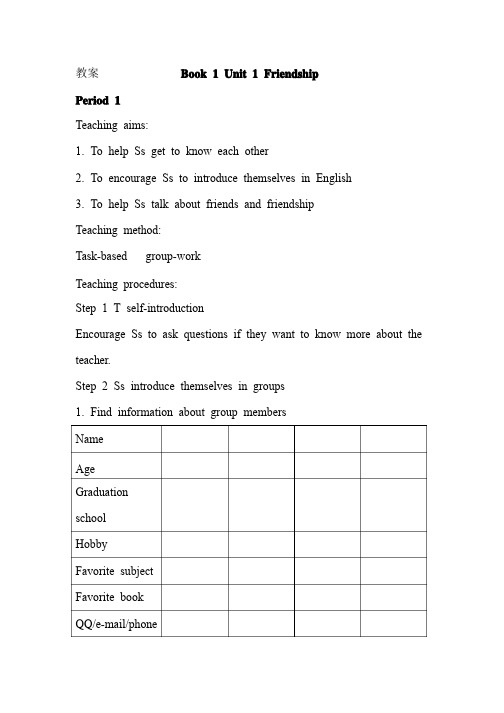
Name Age Graduation school Hobby Favorite subject Favorite book QQ/e-mail/phone number Address 2.Report the discovery Step 3 Talk about friendship 1.Work on the topic in groups: Group 1: famous sayings about friendship Group2: poems about friendship Group3: songs about friendship Group4: Stories about friendship Group5: Movies about friendship Group6: Words and phrases describing a good friend 2.Group report 3.Wb P46 Read the proverbs and translate them into Chinese. 4.Ss P1 Do the survey. Help Ss with new words if necessary. Step 4 Homework Write about yourself including your views on friendship. Name Age Graduation school Hobby Favorite subject Favorite book QQ/e-mail/phone number Address twenty-five months months months before before l I don ’t want to set down a series of facts in a diary as most people do, but but……. l I wonder if it is because I have to be outdoors for so long that I ’ve grown so crazy about everything to do with nature. l … it was the first time in a year and a half that I ’d seen the night face to face …. l I am only able to look at nature through dirty curtains hanging before very dusty windows. l It It’’s s no no no pleasure pleasure pleasure looking looking looking through through through these these these any any any longer longer longer because because because nature nature nature is is one thing that really must be experienced. Homework Write a summary of Anne ’s story. Handout for SsFind sentences that describe Anne ’s feelings towards nature. 1._________________________________________________________2._________________________________________________________3._________________________________________________________ Discover sentence structures (complete the sentences):l She and her family hid away for nearly twenty-five months _______________________. l I don’t want to set down a series of facts in a diary _____________ but I want this diary itself to be my friend …l I wonder if____________ I have to be outdoors for ___________’ve grown so crazy about everything to do with nature. l …it it was was was the the the first first first time time time in in in a a a year year year and and and a a a half half half ____________the ____________the ____________the night night face to face …. l I am only able to look at nature through dirty curtains _______before very dusty windows. l _________________ because nature is one thing that really must be experienced. Period 3 Discovering useful words and expressionsTeaching aims: 1. Key words: upset, ignore, loose, settle, suffer, recover, entirely, power, dusty 2. Key phrases: calm down, be concerned about, go through, set down, a series of, on purpose, in order to, at dusk, face to face, no longer, suffer from Teaching methods: discovering, translation Teaching procedures: 1. Revision Ask a few students to read out their summary of Anne’s story. 2. Discover key words and phrases in Warming up and Reading. 3.Do Ex.1;Ex.2;Ex.3 in P4 4.Check the answers. 5.Choose some of the words and phrases in the exercises to write a short passage. Homework 1.Memorize new words and phrases. plete the writing. Period 4 Discovering useful structures Teaching aims: 1. Help Ss understand the differences between direct and indirect speech. 2. Ss can change sentences from direct speech into indirect speech. 3. Ss can change sentences from indirect speech into direct speech. Teaching methods: discovering, group work Teaching procedures: 1. 1. Ask Ask Ask Ss Ss Ss to to to share share share their their their writings writings writings in in in groups. groups. groups. Correct Correct Correct mistakes mistakes mistakes for for for each each other. 2. Read the sentences in Ex.1, P5 and find the differences between direct and indirect speech. 3. Work out the rules in groups of four. 4. Do Ex. 2, P5. 5. Do Ex.1, P42 Read the passage and mark the changes when turned into indirect speech. Retell the story using indirect speech. Homework Rewrite paragraph 1&2 in the reading, P2, using direct speech. Teaching aims: 1.Ss can understand the letter. 2.Most Ss can finish the listening tasks. Teaching methods: Task-based, discussion Reading 1.Read the letter in Ex.1, P6. Make sure Ss can understand the letter. 2.Predict what Miss Wang will say. Collect ideas in class. Listening ’s advice. 1.Listen to the tape for the first time and find Miss Wang2.Listen again and complete Ex.2&3 in P6 plete exercises in P43 Homework Review new words and expressions in this unit. Teaching aims: 1. Students can follow the steps of the writing. 2. Most students can finish the first draft. Teaching method: task-based Teaching procedures: 1. Read the letter and find Xiao Dong ’s problem. 2. Brainstorm Brainstorm with with with a a a partner partner partner about about about ways ways ways to to to change change change the the the situation situation situation and and make a list of the ideas and reasons. 3. Compare the ideas and choose two of the best to complete the chart in the book. 4. Put the ideas into an order. 5. Study the sample carefully. 6. Write the first draft. 7. Swap Swap the the the letter letter letter with with with your your your partners partners partners and and and help help help correct correct correct mistakes mistakes mistakes in in spelling, verb forms, or punctuation. 8. Write the second draft. Homework: Complete the writing. Ⅰ联想记忆(根据提示写出相应的词汇以及相关短语) 1.______ v t. & v i.(使)平静;adj.平静的→________(使)平静下来→保持镇定_______ 平静的→________挂念→as_far_as sb./sth. is______→______ to do/_______ doing sth. ________t 不同意→________Sentence structures:twenty-five months months months before before before they they they were .It ’s_no_pleasure looking through these any longer... I am only able to look at nature through dirty curtains hanging_before_very_dusty_windows. 6. I would_be_grateful_if_you_could give me some advice. Ⅰ.语境填词settle ,suffer ,recover ,disagree ,calm ,upset ,ignore ,concern ,outdoors ,entireHis absence made_it_more_difficult_for_us. .While_you_were_walking the dog, you were careless and it got loose. t imagine what I am experiencing. I really want to change the situation, but I donI find_it_is_hard to get along with him. 4. She said she would _____________________the next day.(get) 她说她第二天会请人(修理工)修理她的自行车。
- 1、下载文档前请自行甄别文档内容的完整性,平台不提供额外的编辑、内容补充、找答案等附加服务。
- 2、"仅部分预览"的文档,不可在线预览部分如存在完整性等问题,可反馈申请退款(可完整预览的文档不适用该条件!)。
- 3、如文档侵犯您的权益,请联系客服反馈,我们会尽快为您处理(人工客服工作时间:9:00-18:30)。
U nit oneFriendshipTeaching aims:1.能力目标:a.Listening: get information and views from the listening material;b.Speaking: express one’s attitude or views about friends and friendship inappropriate words.c.Reading: enable the Ss to get the main idead.Writing: write some advice about making friend as an editor2.知识目标:a.Talk about friends and friendship; how to make friends; how to maintainfriendshipe the following expressions:I think so. / I don’t think so.I agree. / Idon’t agree.That’s correct.Of course not.Exactly.I’m afraid not.c. to enable the Ss to control direct speech and indirect speechd. vocabulary: upset , calm , concern , loose, Netherlands, German, series, outdoors, dusk, crazy , purpose , thunder , entire, entirely, power , curtain, dusty, partner, settle, suffer , highway,recover, pack, suitcase, overcoat, teenager, exactly, disagree, grateful, dislike, tip , swap , itemadd up \ calm down\ have got to \be concerned about \ walk the dog \ go through \ set down \a series of \ on purpose \ in order to \at dusk \ face to face \ no longer\not …any longer\ suffer from\ get\be tired of \ pack sth. up \get along with \ fall in love \ join in3. 情感目标:a. To arose Ss’ interest in learning English;b. To encourage Ss to be active in the activities and make Ss to be confident;c. To develop the ability to cooperate with others.4. 策略目标:a. To develop Ss’cognitive strategy: taking notes while listening;b. To develop Ss’ communicative strategies.5. 文化目标:to enable the Ss to get to know different opinions about making friends from different countries.Teaching steps:Period oneStep1. Warming up1. Ss listen to an English song AULD LANG SYNE.2. Brainstorming: let Ss say some words about friendship – honest, friendly, brave,humorous, funny, wise, kind, open-minded, responsible, helpful….Step 2.Talk about your old friends1.Ss talk about their old friends inJuniorMiddle School, talk about their appearance,personality, hobbies, etc.2.Self-introductionStep 3. Make new friends1.Ss go around and ask their new friends some information and fill in the followingStep 4. Do a surveySs do the survey in the text ,P1Sep 5. Listening and talkingDo Wb P41 (Talking). While Ss listen to the material, ask them to take notes about the speaker’s views of making friends.When Ss make their conversation, ask them to try to use the following expressions.I think so. / I don’t think so. I agree. / Idon’t agree.That’s correct.Of course not.Exactly.I’m afraid not.Step 6. DiscussionDivide Ss four in one group and each group choose a topic to discuss. There are four topics.Topic 1: Why do you need friends? Make a list of reasons why friends are important to you.Topic 2: There is a saying “to have a good friend, you need to be a good friend.”W hat do you think of the saying and how can you be a good friend?Topic 3: Does a friend always have to be a person? What else can be your friend?Why? Topic 4: List some qualities of a person who does not make friend easily.Step 7. Summary1.Ask Ss themselves to summarize what is friendship and what is the most importantin making friends.2.T shows more information about friendship and a poem about friendship.What is friendship?I want to find the answer to the questionWhat is friendship?When it rains, I think friendship is a small umbrella.It can give me a piece of clear sky.When I’m crying, I think friendship is a white handkerchief.It can wipe my tears dry.When I am sad, I think friendship is a warm word.It can bring me happiness again.When I am in trouble, I think friendship is a strong hand.It can help me escape my troubles.When I sit in a quiet place, I think friendship is a very wonderful feeling.It can’t be pulled and torn, because it is in everyone’s heart.It is there from the beginning to the end of our lives.3. Tell Ss: make new friends and keep the old; one is silver and the other is gold. Step 8. EvaluationSs finish the following evaluation form. Standard: A, B,CContents 自评他评1. I’m active in talking with others.2. I’m active in cooperating with others.3.I can express myself fluently, accurately andappropriately.4. Iknow more about friendship after this lesson..5. Do you think you need to improve yourself in some aspects? Which aspects? 1.Look up the new words and expressions in warming up and pre-reading in adictionary.2.Write a short passage about your best friend.Period twoStep1.Warming upActivity1: Suppose you have to stay indoors to hide yourself for a whole year. You can never go outdoors, otherwise you will be killed. You have no telephone, computer, or TV at home.How would you feel?What would you do?Four students a group discuss with each other for 2 minutes.Activity2: Play a short part of the movies Schindler’s ListStep2. PredictingStudents read the title of the passage and observe the pictures and the outline of it to guess:Who is Anne’s best friend?What will happen in the passage?Step3. SkimmingStudents skim the passage in 2 minutes to get the main idea :Who is Anne’s best friend?When did the story happen?Step4. ScanningStudents work in pairs to find the information required below:Annein World War ⅡStep5. Intensive readingStudents work in group of four to discuss the following open questions:What ?1.Why did the windows stay closed?2.How did Anne feel?3.What do you think of Anne?4.Guess the meanings of “spellbound”, “ hold me entirely in their power”from the discourse(语篇,上下文).5.Which sentences attract you in the passage?Step6. ActivityFour students a group to discuss the situation:Suppose you four have to hide yourselves for 3 months. During the three months, you will be offered the basic food, water and clothes. Your group can take 5 things with you.What will you take? Why?How will you spend the 3 months?How will you treat each other and make friends ?Step7.AssignmentTask1.Surf the internet to find Anne’s Diary and read some of it. Print out a piece of the diary and write down your feelings after reading it on the page. We will share the pieces and your feelings with the whole class.Task2.Ex2、3、4on Page3Period threeStep 1. Warming upCheck the Ss’ assignment: task 2Step 2. Language points:1.add (v.)1). To put together with something else so as to increase the number, size, importance, etc.增加,添加Please add something to what I’ve said, John.2). To join numbers, amount, etc so as to find the total 相加Add up these figures for me, please.add to something: to increase 增加What he did has added to out difficulties.add up to: to amount to 加起来等于;总计The cost added up to 100 million yuan.2. go through1). To examine carefully 仔细阅读或研究I went through the students’ papers last night.2). To experience 经历,遭受或忍受You really don’t know what we went through while working on this project.3. crazy (adj.)1). mad, foolish 疯狂的,愚蠢的It’s crazy to go out in such hot weather.2). wildly excited; very interested 狂热的,着迷的She is crazy about dancing.4.be concerned about/for: be worried about 担心We’re all concerned about her safety.Step 3. Learning about language1.Finish Ex.1, 2 and 3. on Page 4.2.Direct speech and indirect speech: Ss do Ex.1 and 2 on Page 5. Then let the Ssthemselves discover the structures.Step 4. PracticeUsing structures on Page 42: ask the Ss to use indirect speech to retell the story.Step 5. AssignmentFinish Wb. Ex, 1 and2 on page 41 and 42.Period fourStep 1. RevisionCheck the Ss’ assignment.Step 2. R eadingSs read the letter on page 6Notes:1.get along with2.fall in loveStep 3. ListeningSs should take notes while they are listening.1. first listening: Ss listen and answer the questions of part 2 on page 6.2. second listening: Ss listen again and finish part 3 on page 6.Step 4. ListeningSs listen to a story about Anne and try to finish Wb. Ex 1 and 2 on page 43 and page 44.Step 5. SpeakingSs work in groups of four. Design a questionnaire to find out what kind of friends your classmates are. They can use the quiz in the Warming up to help them.Step 6. Assignment1. Ss prepare the reading task on page 44.2. Surf the internet and find some material about friendship in different countries. Period fiveStep 1. Warming upSs say something about making friends and how to maintain friendship.Step 2. ListeningSs listen to a short passage and fill in the blanks on page 41 (listening).Step 3. Reading1.first reading: Ss read the passage about friendship in Hawaii and finish Wb.Ex1.onpage 44.2.second reading: Ss read again and discuss the questions on page 44.3.Ss share their material about friendship in different countries in groups, and thenchoose some groups to show theirs in class.Step 4. assignmentSs collect some proverbs about friendship.Period sixStep 1. Pre-writing1.Read a letter from a student called Xiaodong.2.Go over the advice on page 7 and be ready for writing.Step 2. While-writingAsk the Ss to write a letter to Xiaodong as an editor and give him some advice.1.Ss make a list about the important information that they need.2.Ss begin to write the letter to Xiaodong.3.Ss revise their letters by themselves.4.Ss exchange their writing paper with their partners and correct the mistakes. (tense,spelling, letters, structures….)5.Ss get back their own writing paper and write the letter again.Step 3. Post-writingChoose some students’ writing paper and show in the class. Ask the Ss to correct the mistakes together and also learn from some good writings.Step 4. Writing for fun1.Ss read the passage on page 7 by themselves.2.Ss try to write a few lines to describe their best friends or a person they know.3.Show some Ss’ writings in class.Step 5.AssignmentDo Wb writing task on page 46.Period sevenTeachers can use this period freely.Suggestion: Teachers can use this period to let Ss sum up what they have learned and explain what Ss couldn’t understand very well in this unit. Teachers can also add more practice in this period to consolidate what the Ss have learned. Finally, ask the Ss to finish checking yourself on page 47. It is very important to improve their learning.Unit 1 Friendship(1) 课题:Friendship (2) 教材分析与学生分析:本单元的中心话题是“友谊”,几乎所有的内容都是围绕这一中心话题展开的。
